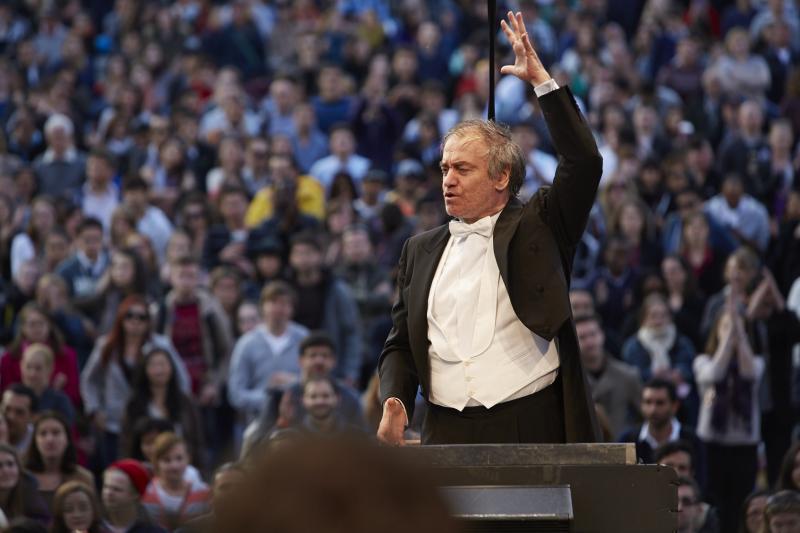LSO, Gergiev, Barbican | reviews, news & interviews
LSO, Gergiev, Barbican
LSO, Gergiev, Barbican
Big symphonies by an exquisite Russian piano miniaturist make strong impact

The Tchaikovsky de nos jours, is Theodore Gumbril’s dismissal of Skryabin in Aldous Huxley’s Twenties novel Antic Hay. For some reason, Alexander Skryabin has suffered more than most from snap judgements of this kind. He has been the woolly theosophist, the vacuous, over-inflated mystifier, the effete, self-indulgent decorative – everything except the refined, disciplined creative genius.
Skryabin was fundamentally a pianist and a piano-composer. He was a contemporary and fellow-pupil of Rachmaninov, but his sensibility was quite different. He lacked his colleague’s virile tunefulness and was uninterested in the Russian Orthodox chant that was a key source of Rachmaninov’s melody. Instead he drew on Liszt (and to some degree Chopin) for a harmonic and keyboard language that became more and more esoteric, exquisite and concentrated as he got older. He died aged 43 in 1915 of septicaemia from an untreated boil on his upper lip, but I’ve often wondered how he would have fared in the brusque, matter-of-fact world of early Soviet art: badly, I suppose, like his most interesting successor, Nikolai Roslavets, who survived physically but was later airbrushed out of Soviet music history.
These were fine, controlled performances, correctly free in style but never rambling or diffuse
Skryabin wrote a handful of large-scale works, but to my mind his essential genius (like Chopin’s) was as a miniaturist. In bigger pieces like the hour-long First Symphony he tended to get trapped into overworking short-winded ideas and building them up to grandiose climaxes that don’t quite punch their weight. This is even still to some extent the case with the mature so-called Fourth Symphony, whose proper title, Poem of Ecstasy, gives some idea of Skryabin’s tendency to work himself up into a frenzy of what Wagner would probably have called effects without causes.
All the same, there is superb music in both works, and not least some brilliant orchestral writing – unexpected in a composer nine-tenths of whose music is for solo piano (Chopin, by comparison, had no interest in the orchestra and no idea what to do with it). The First Symphony shows that Skryabin had been listening closely to Wagner and studying his scores, especially I would suggest the second act of Tristan und Isolde. The music has the same kind of gasping, eloquent beauty, if not a comparable harmonic or melodic range; and this quality survives into the vocal finale (a setting of a rather empty poem in praise of Art by one J Sergennois) at least until the chorus comes in halfway through, at which point the exquisite is abruptly replaced by textbook counterpoint in a bland, Lisztian E major, in obvious reminiscence of that composer’s Faust Symphony.
 Gergiev did both works proud, without the slightest trace of apology. These were fine, controlled performances, correctly free in style but never rambling or diffuse, and wonderfully well-played by a full-strength LSO. In both quality and quantity, the sound – orchestral and choral – was terrific. Gergiev also produced a pair of excellent soloists from the Mariinsky, the mezzo-soprano Ekaterina Sergeyeva (pictured right) and the tenor Alexander Timchenko: a long way to come, perhaps, to support a composer who didn’t love the human voice. Apart from this finale, one early song and a wordless chorus in Prometheus, Skryabin never wrote for it at all.
Gergiev did both works proud, without the slightest trace of apology. These were fine, controlled performances, correctly free in style but never rambling or diffuse, and wonderfully well-played by a full-strength LSO. In both quality and quantity, the sound – orchestral and choral – was terrific. Gergiev also produced a pair of excellent soloists from the Mariinsky, the mezzo-soprano Ekaterina Sergeyeva (pictured right) and the tenor Alexander Timchenko: a long way to come, perhaps, to support a composer who didn’t love the human voice. Apart from this finale, one early song and a wordless chorus in Prometheus, Skryabin never wrote for it at all.
Gergiev offset the Skryabin pieces, aptly enough, with Liszt’s A major piano concerto, another work that makes a little too much of not much, but gets away with it by sheer technical wizardry. Denis Matsuev treated it as a masterclass in effortless, unself-promoting bravura: the piano as king, without the flailing arms or wild hair-do that one imagines gave Liszt his special cachet. Superb in every way.
rating
Share this article
Add comment
The future of Arts Journalism
You can stop theartsdesk.com closing!
We urgently need financing to survive. Our fundraising drive has thus far raised £49,000 but we need to reach £100,000 or we will be forced to close. Please contribute here: https://gofund.me/c3f6033d
And if you can forward this information to anyone who might assist, we’d be grateful.

Subscribe to theartsdesk.com
Thank you for continuing to read our work on theartsdesk.com. For unlimited access to every article in its entirety, including our archive of more than 15,000 pieces, we're asking for £5 per month or £40 per year. We feel it's a very good deal, and hope you do too.
To take a subscription now simply click here.
And if you're looking for that extra gift for a friend or family member, why not treat them to a theartsdesk.com gift subscription?
more Classical music
 Bizet in 150th anniversary year: rich and rare French offerings from Palazzetto Bru Zane
Specialists in French romantic music unveil a treasure trove both live and on disc
Bizet in 150th anniversary year: rich and rare French offerings from Palazzetto Bru Zane
Specialists in French romantic music unveil a treasure trove both live and on disc
 Scottish Chamber Orchestra, Ibragimova, Queen’s Hall, Edinburgh review - rarities, novelties and drumrolls
A pity the SCO didn't pick a better showcase for a shining guest artist
Scottish Chamber Orchestra, Ibragimova, Queen’s Hall, Edinburgh review - rarities, novelties and drumrolls
A pity the SCO didn't pick a better showcase for a shining guest artist
 Kilsby, Parkes, Sinfonia of London, Wilson, Barbican review - string things zing and sing in expert hands
British masterpieces for strings plus other-worldly tenor and horn - and a muscular rarity
Kilsby, Parkes, Sinfonia of London, Wilson, Barbican review - string things zing and sing in expert hands
British masterpieces for strings plus other-worldly tenor and horn - and a muscular rarity
 From Historical to Hip-Hop, Classically Black Music Festival, Kings Place review - a cluster of impressive stars for the future
From quasi-Mozartian elegance to the gritty humour of a kitchen inspection
From Historical to Hip-Hop, Classically Black Music Festival, Kings Place review - a cluster of impressive stars for the future
From quasi-Mozartian elegance to the gritty humour of a kitchen inspection
 Shibe, LSO, Adès, Barbican review - gaudy and glorious new music alongside serene Sibelius
Adès’s passion makes persuasive case for the music he loves, both new and old
Shibe, LSO, Adès, Barbican review - gaudy and glorious new music alongside serene Sibelius
Adès’s passion makes persuasive case for the music he loves, both new and old
 Anja Mittermüller, Richard Fu, Wigmore Hall review - a glorious hall debut
The Austrian mezzo shines - at the age of 22
Anja Mittermüller, Richard Fu, Wigmore Hall review - a glorious hall debut
The Austrian mezzo shines - at the age of 22
 First Person: clarinettist Oliver Pashley on the new horizons of The Hermes Experiment's latest album
Compositions by members of this unusual quartet feature for the first time
First Person: clarinettist Oliver Pashley on the new horizons of The Hermes Experiment's latest album
Compositions by members of this unusual quartet feature for the first time
 Gesualdo Passione, Les Arts Florissants, Amala Dior Company, Barbican review - inspired collaboration excavates the music's humanity
At times it was like watching an anarchic religious procession
Gesualdo Passione, Les Arts Florissants, Amala Dior Company, Barbican review - inspired collaboration excavates the music's humanity
At times it was like watching an anarchic religious procession
 Classical CDs: Camels, concrete and cabaret
An influential American composer's 90th birthday box, plus British piano concertos and a father-and-son duo
Classical CDs: Camels, concrete and cabaret
An influential American composer's 90th birthday box, plus British piano concertos and a father-and-son duo
 Cockerham, Manchester Camerata, Sheen, Martin Harris Centre, Manchester review - re-enacting the dawn of modernism
Two UK premieres added to three miniatures from a seminal event of January 1914
Cockerham, Manchester Camerata, Sheen, Martin Harris Centre, Manchester review - re-enacting the dawn of modernism
Two UK premieres added to three miniatures from a seminal event of January 1914
 Kempf, Brno Philharmonic, Davies, Bridgewater Hall, Manchester review - European tradition meets American jazz
Bouncing Czechs enjoy their Gershwin and Brubeck alongside Janáček and Dvořák
Kempf, Brno Philharmonic, Davies, Bridgewater Hall, Manchester review - European tradition meets American jazz
Bouncing Czechs enjoy their Gershwin and Brubeck alongside Janáček and Dvořák
 Solomon, OAE, Butt, QEH review - daft Biblical whitewashing with great choruses
Even a top soprano and mezzo can’t make this Handel paean wholly convincing
Solomon, OAE, Butt, QEH review - daft Biblical whitewashing with great choruses
Even a top soprano and mezzo can’t make this Handel paean wholly convincing

Comments
It seems to have escaped most
Matsuev Valery Gergiev and
Interestingly we had intended
Interestingly we had intended to discuss this subject on The Arts Desk but my colleagues Ismene Brown and Tom Birchenough, with their deep knowledge of the Russian dance and film scenes respectively, persuaded me that the argument would need much more nuance and research - not least in the hardly-reported opposition among cultural figures in Russia both to the original letter and to the recent annexation.
You can love your country and even support reunification of the Crimea with Russia, which the original artists may have thought was all they were doing. But they would have to be incredibly naive not to realise that the reunification was being rushed through at gunpoint. Sure, have a referendum in due time with due process of law: these trappings of 'democracy', though, were a mockery. And there's no point in saying, but America did this and that; this was wrong, pure and simple. In Soviet times, any artist had the right to remind silent, as many have done now. Sadly not Gergiev - who can be a great conductor - and Matsuev - who along with Toradze has always been a bulldozer of a pianist whenever I've heard him. How we react to this is up to each person, but I'd hope that concertgoers will start taking notice.